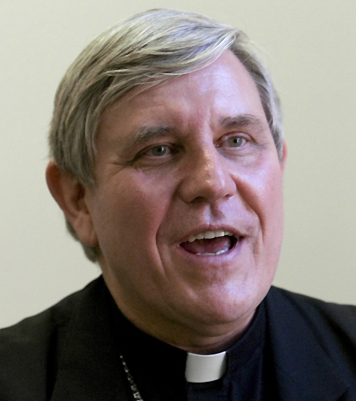Archbishop Also Talks about Victims Group, Role of Women
By Annysa Johnson
Milwaukee Journal Sentinel
March 9, 2010
http://www.jsonline.com/features/religion/87186037.html
[with audio]
MILWAUKEE (WI) -- Milwaukee Archbishop Jerome Listecki said Tuesday that he does not envision denying communion to politicians who vote contrary to church teachings. But he said that he cannot rule it out and that every case would have to be considered individually.
 |
| Listecki |
"You have to consider the impact of whatever that person is doing ... whether you've tried to help them come to an understanding of the teaching," said Listecki, who fielded questions Tuesday at a Milwaukee Press Club's "Newsmaker Luncheon." "It's very difficult for me to see how somebody can be pro-choice knowing the teachings of the church. But individuals may be pro-choice and looking to limit abortions."
Listecki touched on a broad range of topics, although he didn't break new ground. Among the highlights:
• On whether the local bishop should have oversight of individually chartered Catholic colleges and universities: Listecki said any institution that calls itself Catholic, including colleges and universities, derives its identity from the local bishop.
"I would expect an open dialogue with them. I would expect them to understand, if they carry a Catholic identity, the relationship that they have with the bishop in order to maintain that Catholic identity," he said.
• On why he has refused to meet with representatives of the victims advocacy group Survivors Network of those Abused by Priests: Listecki said SNAP has "politicized" the discussion of clergy sex abuse. "I'm concerned with the healing," he said. "And I'm not too sure the issues brought forth by SNAP are about healing."
• On the Vatican's inquiry into Catholic women in religious orders, and the fears of sisters that it's a crackdown meant to push them back into traditional roles: Listecki said the sisters have no cause to worry, and that the inquiry probably will assess what they're doing right, what they can do better and how closely they follow their charism, or purpose for being.
"My sense is one of the aspects the Vatican will be doing is to see how they are responsive to their charism, how they are living their faith," he said. "When you take a look at the power of religious women, we want to maximize that power. We don't want to ... diminish that power."
Any original material on these pages is copyright © BishopAccountability.org 2004. Reproduce freely with attribution.